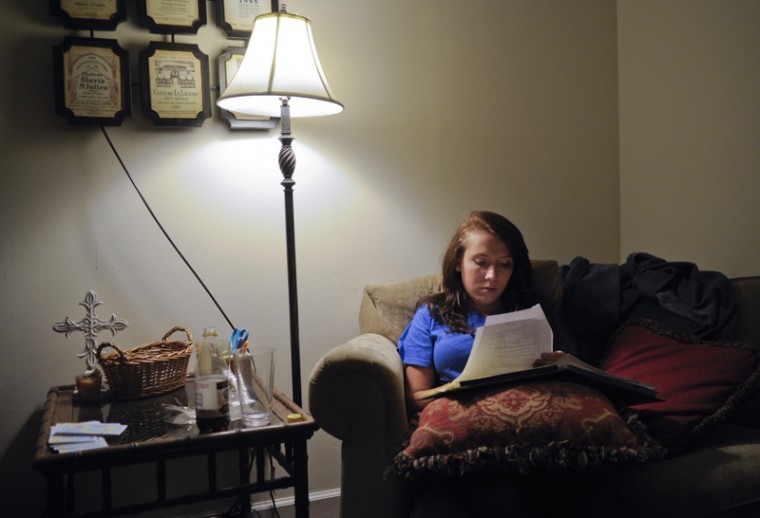Insomnia affects student’s daily lifestyle
April 27, 2012
There are three things that all college students can agree they need more of: time, money and sleep.
Unfortunately, time can’t be created and money doesn’t grow on trees. Sleep, however, greatly impacts the college experience, especially if students aren’t getting enough of it.
Licensed Counseling Psychologist Karl Laves said that difficulty sleeping or lack of sleep is a common complaint among students that seek counseling services.
Laves, assistant director for the Counseling & Testing Center, said the sleeping disorder insomnia, can be caused by a variety of things such as depression, anxiety, excitement or stress.
“Some forms seem to be inherited, but most are developed,” he said. “It can also occur when students develop irregular sleep patterns.”
Owensboro sophomore Jessica Booth developed insomnia in high school when she was dealing with anxiety and depression.
She sought medical attention for her anxiety and depression, and she took sleeping pills for insomnia but said those didn’t help for long.
“It would help me fall asleep, but it didn’t help me stay asleep,” Booth said.
Her parents thought she had bad sleeping habits and encouraged her to “sleep better,” but she said it wasn’t and still isn’t that easy.
Most nights, she lies in bed for hours trying to relax, but her mind is constantly racing thinking about school, family and friends.
“I worry about everyone else and their problems,” she said. “I always feel like I have to be the one that’s there to help people.”
Although the people closest to her will always be cognizant, she found a way to organize some of her thoughts before bed.
“I’ll make a list of everything I have to get done, and it helps ease my mind,” she said.
Booth is the eldest of her siblings and works as a resident assistant in Zacharias Hall.
Her friend and resident Ali Cialdella said she respects the time that Booth does sleep because she knows it’s very important to her.
If Cialdella does have to wake her, she does so quietly and makes sure it’s necessary.
“I’ll try to warn people if she’s sleeping,” said Cialdella, a senior from Indianapolis. “She has a short fuse when she doesn’t sleep.”
Bowling Green freshman Meg Jones, who also deals with insomnia, notices a change in her mood when she doesn’t sleep.
“Sometimes if I haven’t gotten enough sleep, I’m grouchy,” she said.
To avoid feeling crabby, Jones tries to squeeze in naps after class, especially if she didn’t sleep the night before.
Jones said her sleep pattern is random, but she’s used to it because it’s been that way since middle school.
“Sometimes I can go to sleep at noon, other times it could be 2 a.m.,” she said. “It just depends on the day.”
Insomnia has affected every aspect of Booth’s life, mentally, physically and emotionally.
She said it’s common to go days without sleeping, causing her days to run together, which puts her on edge and leads to procrastination.
“It makes it really hard to focus on things because you’re so exhausted,” she said.
When she finally does get sleep, she crashes and may sleep for days.
However, she hasn’t told her professors about her battle with insomnia because she doesn’t want to be treated differently.
“I try not to make that my excuse and just deal with it,” she said. “I can still get stuff done just as much as anybody.”
Instead, she’s found ways to lessen her insomnia in order to stay on track.
Booth is a graphic design major and creates art to tune out everything.
She tries to exercise at least 30 minutes a day and eats a lot of fruit.
“In a way, exercising exhausts your body,” she said. “Even if your mind is still going, it helps you fall asleep.”
Laves offered more tips for counteracting insomnia like ending caffeine intake earlier in the day and maintaining a cool and comfortable sleeping area.
Both agree that creating a solid schedule at night can help students get to sleep at night.
“If it is a medical condition, it will require medical treatment,” Laves said. “Otherwise, most insomnia can be managed or ended by helping a person talk openly about their stress.”
WKU students can use Health Services or Counseling & Testing services to seek help with insomnia.
Booth said she’ll seek medical attention when she can no longer manage her insomnia.
“I think I’ll deal with this for the rest of my life because I’ll constantly have to worry about something,” she said.













